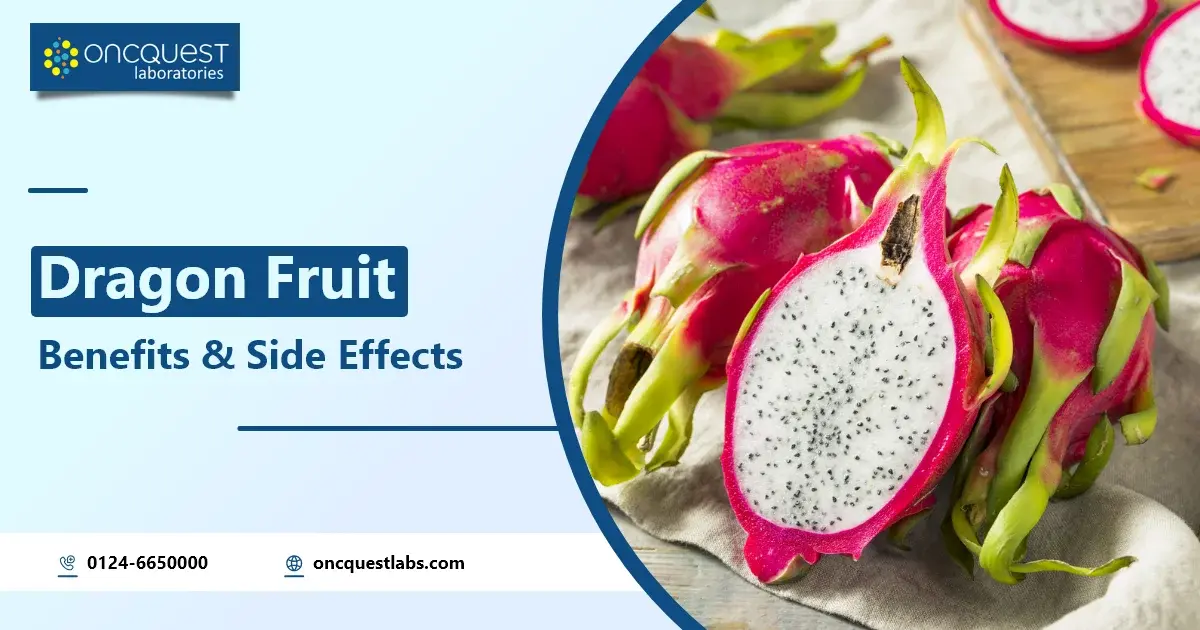Dragon fruit benefits are numerous, making this tropical fruit, also known as pitaya or pitahaya, increasingly popular worldwide. This vibrant fruit, belonging to the cactus family, is renowned for its unique appearance and health advantages. Characterized by its bright pink or yellow skin and speckled flesh filled with tiny black seeds, dragon fruit comes in three main types: white-fleshed (Hylocereus undatus), red-fleshed (Hylocereus costaricensis), and yellow-skinned with white flesh (Hylocereus megaliths).
Dragon fruit benefits extend beyond health, making it a versatile ingredient in the culinary world. Originating from Central America, dragon fruit is now cultivated in various regions, including Southeast Asia, the United States, and Israel. Its mildly sweet taste and crunchy texture enhance a variety of dishes, from fresh fruit salads and smoothies to exotic desserts and beverages.
Beyond its culinary appeal, dragon fruit is celebrated for its impressive nutritional profile and potential health benefits. Packed with essential vitamins, minerals, and antioxidants, dragon fruit benefits various aspects of health, from boosting the immune system to promoting skin health. However, like any other food, it is essential to be aware of potential side effects and consume it in moderation.
Contents
Dragon Fruit Nutrition Data
Sure! Here’s a table outlining the nutrition data for dragon fruit (per 100 grams):
| Nutrient | Amount per 100g |
| Calories | 50 |
| Protein | 1.1 g |
| Fat | 0.4 g |
| Carbohydrates | 11 g |
| Fiber | 3 g |
| Sugars | 8 g |
| Vitamin C | 3 mg |
| Vitamin A | 0 IU |
| Calcium | 9 mg |
| Iron | 0.3 mg |
| Magnesium | 18 mg |
| Phosphorus | 36 mg |
| Sodium | 1 mg |
| Potassium | 116 mg |
This table provides an overview of the key nutrients found in dragon fruit, highlighting its low calorie and fat content along with its richness in essential vitamins and minerals.
10 Health Benefits of Dragon Fruit
Rich in Nutrients
Dragon fruit is a nutritional powerhouse, offering a wide array of essential nutrients while being low in calories. It is rich in Vitamin C, which boosts the immune system, and B vitamins like B1 (Thiamine), B2 (Riboflavin), and B3 (Niacin) which play key roles in energy production and overall metabolic function. Additionally, dragon fruit provides vital minerals such as iron, which is crucial for oxygen transport in the blood, magnesium, which supports muscle and nerve function, and calcium, important for bone health. The fruit’s high fiber content aids digestion and promotes a healthy gut. This nutrient-rich profile makes dragon fruit an excellent addition to a balanced and healthy diet.
High in Antioxidants
Dragon fruit is exceptionally high in antioxidants, compounds that protect your cells from damage caused by free radicals. These antioxidants include betacyanins, betaxanthins, and flavonoids. Betacyanins, responsible for the fruit’s vibrant red or pink color, have been shown to reduce oxidative stress and inflammation. Flavonoids, another powerful antioxidant group, contribute to heart health and have anti-cancer properties. Consuming dragon fruit regularly can help lower the risk of chronic diseases such as heart disease, diabetes, and cancer. By neutralizing harmful free radicals, these antioxidants support overall health and well-being, making dragon fruit a valuable addition to your diet.
Boosts Immune System
Dragon fruit benefits include being a potent immune system booster, primarily due to its high Vitamin C content. Vitamin C is crucial for stimulating the production and function of white blood cells, which are essential for fighting infections and protecting the body against pathogens. Additionally, dragon fruit contains beneficial antioxidants that further support immune health by reducing inflammation and oxidative stress. The presence of essential minerals like iron, which aids in oxygen transport and energy production, also contributes to a robust immune system. Regular consumption of dragon fruit can help enhance your body’s natural defense mechanisms, keeping you healthier and more resilient against illnesses. Embracing dragon fruit benefits can significantly fortify your immune system, promoting overall health and vitality.
Aids Digestion
Dragon fruit is an excellent source of dietary fiber, which aids in digestion and promotes regular bowel movements. The fiber content helps prevent constipation and promotes a healthy digestive tract by fostering the growth of beneficial gut bacteria.
Supports Heart Health
Dragon fruit is excellent for digestion, thanks to its high dietary fiber content. Fiber is essential for maintaining regular bowel movements and preventing constipation. It helps bulk up stool and promotes smooth passage through the digestive tract. Additionally, the prebiotics in dragon fruit support the growth of beneficial gut bacteria, enhancing overall gut health and improving nutrient absorption. These beneficial bacteria can also help reduce symptoms of digestive disorders such as irritable bowel syndrome (IBS). By incorporating dragon fruit into your diet, you can promote a healthy digestive system, ensuring that your body efficiently processes and absorbs the nutrients from the foods you eat.
Promotes Healthy Skin
Dragon fruit supports heart health in multiple ways. It helps reduce bad cholesterol (LDL) levels while increasing good cholesterol (HDL) levels, thanks to its high fiber content and beneficial plant compounds. The tiny seeds within dragon fruit are rich in omega-3 and omega-6 fatty acids, which are known to reduce the risk of cardiovascular diseases. These fatty acids help lower blood pressure and prevent inflammation, further protecting the heart. Additionally, the antioxidants in dragon fruit combat oxidative stress, reducing the risk of atherosclerosis and heart disease. Regular consumption of dragon fruit can contribute to overall cardiovascular well-being, promoting a healthier heart and circulatory system.
Regulates Blood Sugar
Dragon fruit promotes healthy skin due to its rich content of vitamins, antioxidants, and hydration properties. The high Vitamin C levels in dragon fruit boost collagen production, essential for maintaining skin elasticity and firmness. Antioxidants such as betacyanins and flavonoids protect the skin from damage caused by free radicals, reducing signs of aging like wrinkles and fine lines. Additionally, dragon fruit’s hydrating properties help maintain skin moisture, keeping it supple and smooth. Applying dragon fruit topically can soothe sunburns and inflammation due to its cooling and anti-inflammatory effects. Incorporating dragon fruit into your diet and skincare routine can lead to a healthier, more radiant complexion.
Anti-Inflammatory Properties
Dragon fruit possesses significant anti-inflammatory properties, making it beneficial for reducing inflammation in the body. This fruit is rich in antioxidants like betalains, which help to combat oxidative stress and reduce inflammatory markers. These compounds can be particularly helpful for individuals suffering from chronic inflammatory conditions such as arthritis. Additionally, the Vitamin C in dragon fruit boosts the immune system, aiding in the body’s natural ability to fight inflammation. By incorporating dragon fruit into your diet, you can potentially reduce inflammation, alleviate symptoms of chronic inflammatory diseases, and promote overall health and well-being. Regular consumption can contribute to a healthier, inflammation-free lifestyle.
Enhances Metabolism
Dragon fruit enhances metabolism thanks to its rich content of B vitamins, particularly B1 (Thiamine), B2 (Riboflavin), and B3 (Niacin). These vitamins play a crucial role in converting food into energy, ensuring that your body’s metabolic processes function efficiently. Thiamine aids in carbohydrate metabolism, Riboflavin helps in breaking down proteins, fats, and carbohydrates, and Niacin supports overall energy production and cellular repair. Additionally, the fruit’s high fiber content aids digestion, which is essential for a healthy metabolism. Incorporating dragon fruit into your diet can help boost your energy levels, improve nutrient absorption, and support a well-functioning metabolic system, contributing to overall health and vitality.
Promotes Healthy Eyes
Dragon fruit promotes healthy eyes due to its high content of beta-carotene, a precursor to Vitamin A. Vitamin A is essential for maintaining good vision, particularly in low-light conditions. Beta-carotene helps protect the cornea, the eye’s surface, and supports overall eye health. Additionally, dragon fruit contains other antioxidants that combat oxidative stress, reducing the risk of age-related macular degeneration and cataracts. Regular consumption of dragon fruit can help maintain clear vision and protect the eyes from damage caused by free radicals. By including dragon fruit in your diet, you can support long-term eye health and reduce the risk of various eye-related conditions.
Dragon Fruit Side Effects
Allergic Reactions
While rare, some individuals may experience allergic reactions to dragon fruit. Symptoms can include itching, swelling, hives, and in severe cases, anaphylaxis, which is a potentially life-threatening condition requiring immediate medical attention. People with known allergies to other fruits or cacti should be cautious when trying dragon fruit for the first time. If any allergic symptoms are observed, it’s important to discontinue consumption and seek medical advice.
Digestive Issues
Dragon fruit is high in dietary fiber, which is generally beneficial for digestion. However, consuming large amounts can lead to digestive discomfort, such as bloating, gas, and diarrhea. This is especially true for individuals who are not accustomed to a high-fiber diet. To avoid these issues, it is recommended to start with small amounts and gradually increase intake, allowing the digestive system to adjust.
Interference with Medications
Dragon fruit may interact with certain medications, particularly those that are metabolized by the liver. For example, it can affect the efficacy of medications like statins and anticoagulants. The fruit’s high antioxidant content can interfere with the way these drugs are processed by the body. If you are on any long-term medication, it’s important to consult with a healthcare provider before adding dragon fruit to your diet to avoid potential interactions.
Blood Sugar Levels
Although dragon fruit has a low glycemic index, consuming it in large quantities can still impact blood sugar levels, particularly in individuals with diabetes. It’s important for diabetics to monitor their blood sugar levels closely when incorporating dragon fruit into their diet. Consulting with a healthcare provider can help determine the appropriate amount that can be safely consumed without adversely affecting blood glucose levels.
Skin Reactions
Some people might experience skin reactions when handling or consuming dragon fruit. This can include rashes, redness, or itchiness. These reactions are often mild but can be uncomfortable. If you notice any skin irritation after touching or eating dragon fruit, it’s advisable to wash the affected area with soap and water and avoid contact in the future. For severe reactions, seeking medical advice is recommended.
Overconsumption Risks
Eating large quantities of dragon fruit can lead to an imbalance of nutrients in the body. For example, excessive fiber intake can interfere with the absorption of other nutrients, leading to deficiencies. Additionally, consuming too much of the fruit can result in gastrointestinal discomfort. Moderation is key; it’s best to enjoy dragon fruit as part of a balanced diet to reap its benefits without experiencing negative side effects.
How to Eat Dragon Fruit
Dragon fruit benefits are plentiful, and eating this fruit is simple and enjoyable, thanks to its versatile nature and mild, sweet flavor. To begin, select a ripe dragon fruit, which should give slightly to pressure, similar to a ripe kiwi or avocado. Start by cutting the fruit in half lengthwise to reveal its vibrant, speckled flesh. You can scoop out the flesh using a spoon and eat it directly, or cut it into cubes for a more bite-sized option. Dragon fruit can be added to fruit salads, blended into smoothies, or used as a topping for yogurt and oatmeal. For a refreshing treat, try chilling the fruit before eating. You can also incorporate it into savory dishes, such as salsas or salads, for a burst of color and nutrition. Its subtle sweetness pairs well with other tropical fruits like mango and pineapple. Whether enjoyed on its own or as part of a recipe, dragon fruit benefits your diet by providing delicious flavor and valuable nutrients.
Conclusion
Dragon fruit benefits are numerous, making this striking fruit a fantastic addition to any diet. Its rich nutrient profile, including vitamins, minerals, and antioxidants, supports various aspects of health, from boosting the immune system to promoting heart health and enhancing metabolism. However, it’s important to be aware of potential side effects, such as allergic reactions and digestive issues, and to consume it in moderation. Whether enjoyed fresh, in smoothies, or as part of savory dishes, dragon fruit offers a delicious and nutritious way to support overall well-being. Embracing dragon fruit benefits can significantly enhance your dietary health and provide essential nutrients for optimal body function.
FAQ
What does dragon fruit taste like?
Dragon fruit has a mildly sweet taste with a hint of tartness. Its texture is similar to that of a kiwi, with small, crunchy seeds dispersed throughout the flesh.
How do I know if a dragon fruit is ripe?
Ripe dragon fruit will have bright, evenly colored skin and will give slightly to pressure, similar to a ripe kiwi or avocado. Avoid fruits with blemishes or overly soft spots.
Can I eat the skin of a dragon fruit?
No, the skin of dragon fruit is not edible. It is best to scoop out the flesh and discard the skin.
How should I store dragon fruit?
Store dragon fruit at room temperature if you plan to eat it within a few days. For longer storage, place it in the refrigerator, where it can last up to two weeks.
Is dragon fruit good for weight loss?
Yes, dragon fruit is low in calories and high in fiber, making it a good option for weight loss. It can help you feel full longer and aid in digestion.
Can diabetics eat dragon fruit?
Dragon fruit has a low glycemic index, making it suitable for people with diabetes. However, it’s important to consume it in moderation and monitor blood sugar levels.





